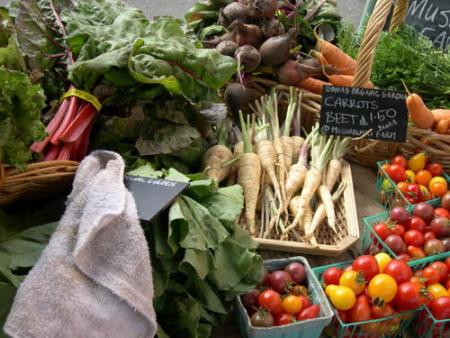Food policy reform advocates seek self-sustainable system by 2030 in California

California has always been on the leading edge of sustainable agriculture policy with what has to be the largest and most diverse selection of food movement organizations. Last week, the Roots of Change Network Summit in Los Angeles brought these groups together, along with government officials and scholars to steer California's food systems on a healthy course. The convention was historic in its scope and far-reaching in its goal of establishing a sustainable food system, statewide, by 2030.
The three-day summit gave birth to the California Healthy Food and Agriculture Platform – a set of specific policy changes, both long and short term, which will move California toward absolute farm sustainability in two decades. Unlike the prevailing policy found in the federal Farm Bill, which protects the interests of exploitative, transnational agribusinesses, this bill is being written by foodies, for foodies with local food economies and the propagation of municipal food-sheds at its base.
“It was inspiring to see so many food-system stakeholders in one place thinking on so grand a scale,” blogged Kristen Ridley about her experience at the event. “It didn't feel pie-in-the-sky either; it felt like something real was beginning to happen.” The Roots of Change (ROC) fund has a history of bringing together food justice and sustainability groups to make things happen, especially in Northern California where San Fran mayor Gavin Newsom has announced food purchasing policies for the city government based in large part on ideas gleaned from the San Francisco Urban-Rural Roundtable, an advisory group funded by ROC.
Citing the need for a "rational food policy" in Los Angeles, Mayor Villaraigosa likewise unveiled the Good Food For All Agenda, a strategy for creating a regional food system in the nation's second most-populous city. This was drafted by Los Angeles' very own Food Policy Task Force, the brainchild and beneficiary of Roots of Change.
What follows is an excerpt from Ms. Ridley's Field Notes from the Roots of Change Summit, Part One:
"The event kicked off Wednesday with the wonderful Good Food For All reception downtown that showcased not just local and statewide food justice and sustainability organizations, but delicious food and beverages from local chefs made with ingredients obtained from the Los Angeles foodshed. Let me tell you, I have never been so sad to be full in my life."
"The proceeds from the event's $100 tickets (mine was graciously paid for by a Roots of Change scholarship) went towards Hunger Action LA and Sustainable Economic Enterprises Los Angeles, two groups working together to stretch government food assistance dollars at farmers' markets through the Veggie Vouchers program. It's an exciting idea that's starting to be implemented in many places. The plan returns tax dollars to the community and improves the health of disadvantaged families, improving quality of life and reducing healthcare costs..."
"On Thursday, with the requisite festivities over, the policy wonkery began. A holistic strategy map was presented, charting the interrelatedness of various aspects of the sustainable food system. Attendees were encouraged to place themselves on the map and use it to identify the area in which they needed more support so that they could work more effectively. Overall strategic priorities and "leverage points," areas in the system where there was a great potential for influence by activists and policy-makers, were outlined and discussed. I have a feeling quite a few people's eyes were glazing over a little at all the talk of systems and schematics, but the questions session posed a number of engaging, intelligent questions."
She went on to state that, “debates were always a matter of angle of degree, never really about opposition.” This is reassuring, considering the magnitude and necessity of the project at hand.
A sustainable food system standing on the proven integrity of localism will nourish not only the people but their pocket books too. The potential economic activity awaiting local farmers, urban gardeners, local food processors and distributors, local vendors, restaurants, farmers' markets, CSA's, and buying clubs can't be suppressed by federal farm subsidies and large food corporations for much longer. With this news, California's long-term economic forecast just got brighter.




